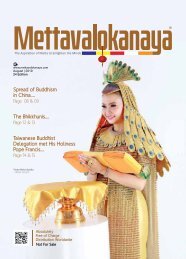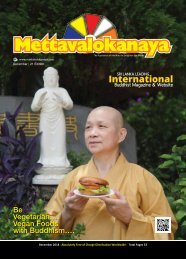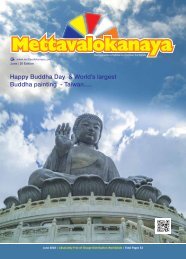Mettavalokanaya_Buddhist_Magazine_March_2019
“Mettavalokanaya” International Monthly Buddhist Magazine has been successfully distributed to 40 countries including all districts across Sri Lanka and now “Mettavalokanaya” is Sri Lankan Most Popular & Leading monthly Buddhist Magazine.
“Mettavalokanaya” International Monthly Buddhist Magazine has been successfully distributed to 40 countries including all districts across Sri Lanka and now “Mettavalokanaya” is Sri Lankan Most Popular & Leading monthly Buddhist Magazine.
You also want an ePaper? Increase the reach of your titles
YUMPU automatically turns print PDFs into web optimized ePapers that Google loves.
“The<br />
<strong>Buddhist</strong><br />
Normative<br />
Ethics”….<br />
“Use <strong>Buddhist</strong><br />
Textual<br />
Materials”….<br />
Writing on normative ethics,<br />
I have benefited a lot<br />
from Western ethical<br />
studies regarding the<br />
establishment of ideological systems and<br />
structures. However, Buddhism is more<br />
than merely ontology or metaphysics. It<br />
is based on its fundamental principle that<br />
developed from experience – dependent<br />
origination (s. pratītya-samutpāda, p.<br />
paticca-samuppāda). This is the principle<br />
that the Buddha realized through his<br />
practical experience of contemplation<br />
and discernment. It is based on this<br />
principle that I discuss and explain the<br />
various topics related to the study of<br />
ethics.<br />
Regarding specific books that<br />
discuss the contemporary study of<br />
<strong>Buddhist</strong> ethics, there are not any lengthy<br />
works in Chinese, although there have<br />
been some articles. In Japanese, there<br />
are The Daily Ethics of Early Buddhism<br />
and Sociological Thoughts of Early<br />
Buddhism by Nakamura Hajime, which<br />
discuss personal/individual ethics, and<br />
group ethics respectively. Nevertheless,<br />
the functioning aim of The Study of<br />
<strong>Buddhist</strong> Ethics is not an abundance of<br />
materials quoted and textual research,<br />
but the digestion of the materials, and<br />
the extraction of their essence, so as<br />
to present a complete, <strong>Buddhist</strong> ethical<br />
system.<br />
In other words, my work here adopts<br />
an analytical, philosophical methodology<br />
and not textual research methods.<br />
There is more logical evidence than<br />
scriptural evidence, and there are more<br />
deductions than summaries. However,<br />
this does not mean that I do not regard<br />
the teachings and making summaries<br />
from materials as unimportant. Rather,<br />
my aim is to present features that are<br />
complementary to other approaches in<br />
my other writing. This allows my written<br />
works to supplement each other.<br />
Theoretically, we cannot neglect<br />
the history of <strong>Buddhist</strong> ethics if we wish<br />
to provide a complete explanation of the<br />
study of <strong>Buddhist</strong> normative ethics. For<br />
example, after the Buddha’s parinirvāïa,<br />
Mahākāśyapa and Pūrna, two of the<br />
foremost disciples of the Buddha, varied<br />
in their views regarding whether leeway<br />
should be given to certain precepts<br />
under special circumstances. Also, during<br />
the period of Mahāyāna Buddhism, the<br />
sūtras adopted a gentle yet mocking<br />
attitude towards the Śrāvaka elders’<br />
system of sangha hierarchy, while<br />
at the same time harboring serious<br />
discrimination and prejudice toward<br />
women. In addition, during the Middle<br />
Mahāyāna Period, the ideology of the<br />
Tathāgatha-garbha gradually developed.<br />
It often tended trespass on to the theory<br />
of dependent origination. Moreover,<br />
in ancient China, Venerable Dao An<br />
(312-385) and Venerable Hui Yan (334-<br />
416) also stated differing views of the<br />
relationship between <strong>Buddhist</strong> religion<br />
and politics.<br />
Without a thorough understanding<br />
of <strong>Buddhist</strong> history, we cannot easily<br />
understand the moral judgments and<br />
controversies of the fundamental<br />
theories mentioned above, and will<br />
therefore have difficulty mastering<br />
the complete picture of the ethical<br />
principles of the various schools. It<br />
will also be difficult to understand the<br />
internal thread of thinking and choices<br />
explained in this book regarding these<br />
controversies.<br />
However, if I include historical<br />
research as well as systematic analysis,<br />
then I must introduce the ideologies<br />
of the various schools, and repeatedly<br />
compare and list their similarities<br />
and dissimilarities, and then present<br />
reasons for choices of selections. In<br />
this way, the book’s categories and<br />
sections will become enormous, petty,<br />
and complicated. This could deter many<br />
people from reading the book. The<br />
adoption of both methods of research at<br />
the same time hinders a well-organized<br />
presentation of the complete outline<br />
and direction of the questions regarding<br />
<strong>Buddhist</strong> normative ethics. Thus, I have<br />
decided to adopt only a systematic<br />
analytical method in this book, and do<br />
not here consider the historical study of<br />
ethics.<br />
How can we establish the<br />
ideological system of <strong>Buddhist</strong> ethics in<br />
accordance with the Buddha’s teachings<br />
and, at the same time, make it acceptable<br />
to <strong>Buddhist</strong>s from all traditions? The<br />
fundamental resources in establishing the<br />
study of <strong>Buddhist</strong> ethics come from the<br />
sūtras and scriptures. Without the sūtras<br />
as the basis, even if the argument is very<br />
reasonable, it can only be considered a<br />
personal point of view, and, as such, how<br />
can it be proved to be in accordance with<br />
the Buddha’s teachings? Furthermore,<br />
among the <strong>Buddhist</strong> sūtras, there are<br />
sūtras of various schools such as the<br />
Śrāvakayāna, Mahāyāna, and sub schools<br />
of Mahayana, such as Vajrayāana. In<br />
addition, the various schools and sects in<br />
India and China tended to have diverse<br />
views on various matters. With such<br />
problems, how can we decide which to<br />
accept or reject? This immediately leads<br />
to an issue that cannot be avoided: the<br />
issue of the analysis and classifications of<br />
teachings.<br />
However, if we wish to include<br />
these teachings in the scope of scriptural<br />
evidence, how can we use the Mahāyāna<br />
sūtras as scriptural evidence to convince<br />
everyone that this is a study of <strong>Buddhist</strong><br />
ethics that is acceptable to both the<br />
southern and northern traditions, and<br />
not merely a study of Mahāyāna <strong>Buddhist</strong><br />
ethics? To establish the teachings of<br />
Mahāyāna, some of the Indian Mahāyāna<br />
ùāstra masters used the legends and<br />
stories from the Iron Bar Compilation to<br />
prove that the Mahāyāna sūtras were<br />
taught by Buddha. However, there is<br />
little or no material evidence for these<br />
proofs. We can only say that they are<br />
beliefs or legends. Some of these points<br />
would not be convincing to the Śrāvaka<br />
scholars. Thus, why should I repeat the<br />
old stories? After much consideration,<br />
when I started writing The Study of<br />
<strong>Buddhist</strong> Ethics, I decided to include the<br />
Mahāyāna teachings in the <strong>Buddhist</strong><br />
ethics system. The reasons come from<br />
considerations of two perspectives:<br />
01 - From practical experiences in<br />
propagating the dharma and benefiting<br />
others, I deeply feel the greatness of<br />
the Mahāyāna bodhisattvas’ aspirations,<br />
the majestic atmosphere that develops<br />
from Mahāyāna Buddhism, and the<br />
boundless comfort it brings to suffering<br />
sentient beings. These are the scopes of<br />
mind with which those Śrāvakas, who<br />
are renowned for having only aimed<br />
for self-liberation, could not compare.<br />
I sincerely believe that for Mahāyāna<br />
Buddhism to have become popular in<br />
ancient India there must have been<br />
deep reflection and reviews among the<br />
<strong>Buddhist</strong> disciples within the sangha<br />
orders, and the public’s vast wishes and<br />
hopes for Buddhism. I am also a part of<br />
the ‘bodhisattva spiritual foundation’,<br />
and therefore I cannot bear to see the<br />
glorious works and enthusiastic vows<br />
and practices of bodhisattvas be placed<br />
outside the study of <strong>Buddhist</strong> ethics.<br />
02 - Contemplating the internal<br />
logic of the teachings and theories, we<br />
can see that from the development<br />
of Śrāvaka Buddhism to Mahāyāna<br />
Buddhism, there has been a consistent<br />
thread of thoughts linking them. They<br />
are not two theories that are completely<br />
disconnected. I do not wish to discuss<br />
the question of whether Mahāyāna<br />
was taught by the Buddha, in the study<br />
of <strong>Buddhist</strong> ethics, as this would divert<br />
us to a lot of tangential questions on<br />
textual research. At the same time, it<br />
would be impossible to satisfy everyone,<br />
i.e., to enable both parties to agree to a<br />
common agenda of discussion questions.<br />
However, through long contemplation<br />
and consideration, and repeated<br />
investigation and authentication, I have<br />
strong confidence that I can, without<br />
using the scriptural evidence exclusively<br />
from the Mahāyāna sūtras, hold onto the<br />
consistent thread of logic directly, and<br />
make a clear presentation of the unique<br />
ethical ideology of Mahāyāna.<br />
Therefore, I will follow the same<br />
style in using scriptural evidence from<br />
the texts of sūtras, as the source of<br />
thoughts for the whole study of <strong>Buddhist</strong><br />
ethics. In addition, I will be using the law<br />
of dependent origination (s. pratītyasamutpāda),<br />
which is most commonly<br />
acknowledged by the various schools of<br />
Buddhism as the fundamental scriptural<br />
evidence (found in the Āgama sutras).<br />
Not only is it the fundamental formula<br />
among all the <strong>Buddhist</strong> theories, it also<br />
does not rely on faith or speculation. It<br />
is a truth that everyone can experience<br />
personally in life. In addition, with<br />
dependent origination as the premise,<br />
detailed logical evidence, from simple to<br />
profound can be deduced.<br />
Taiwan<br />
Professor – Hsuan Chuang<br />
University and Fu Jen<br />
University, Head of the<br />
Department of Religious<br />
Studies in Hsuan Chuang<br />
University, President of Hong<br />
Shi <strong>Buddhist</strong> Cultural and<br />
Educational Foundation,<br />
Dean of the College of Liberal<br />
Arts Hsuan Chuang University<br />
in Taiwan<br />
Most Venerable Bhikkhuni<br />
Chao Hwei Shih<br />
12 l <strong>Mettavalokanaya</strong> l <strong>March</strong> l <strong>2019</strong> l www.mettavalokanaya.com www.mettavalokanaya.com l <strong>2019</strong> l <strong>March</strong> l <strong>Mettavalokanaya</strong> l 13
















